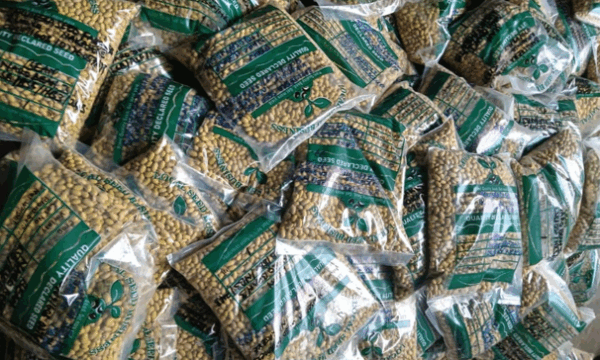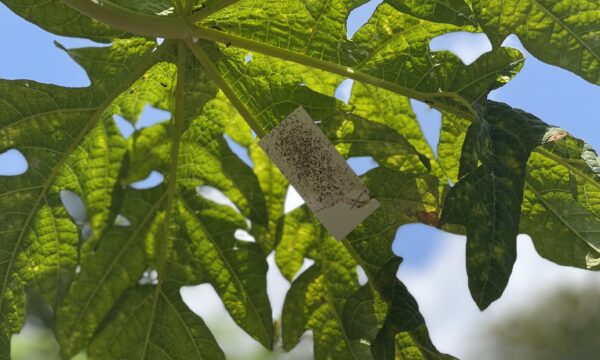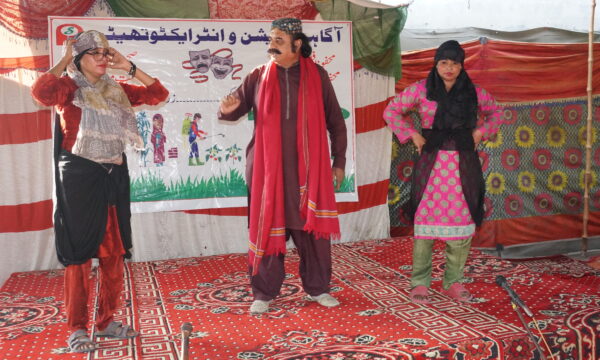Contributed by Roger Day and Noah Phiri, CABI in Africa
[youtube=http://www.youtube.com/watch?v=dApT6tvehT4&w=560&h=315]
Top national agricultural officials and CABI representatives gathered in Malawi recently to officially kick-off Plantwise operations, marking a new chapter for plant health development in the country.
With one small snip, Dr Wilfred Lipita cut the ribbon to officially launch the programme. Dr Lipita is the Controller of Agricultural Extension and Technical Services in Malawi’s Ministry of Agriculture and Food Security, and was representing the Minister, Dr James Munthali.
Earlier this year, Dr Lipita opened the very first plant clinic in Malawi. Since that pilot clinic, 12 more have been established in Mzimba and Lilongwe Districts, where trained plant doctors tend to farmers’ sick plants and help them to prevent their crop losses. Commending the Plantwise approach, Dr Lipita said at the launch event that “Plantwise could have helped us avoid the devastation caused by Banana Bunchy Top Virus (BBTV).”
Although BBTV has affected Malawi for nearly 2 decades already, it  continues to spread and cause huge losses to crops and vital agricultural income. According to Misheck Soko, a chief scientist from Bvumbwe Agricultural Research Station who attended the launch, up to 60% of the country’s crops are lost to BBTV, which is said to be the worst banana disease in the world. Check out this Plantwise knowledge bank fact sheet for more information on BBTV diagnostics and management.
continues to spread and cause huge losses to crops and vital agricultural income. According to Misheck Soko, a chief scientist from Bvumbwe Agricultural Research Station who attended the launch, up to 60% of the country’s crops are lost to BBTV, which is said to be the worst banana disease in the world. Check out this Plantwise knowledge bank fact sheet for more information on BBTV diagnostics and management.
Farmers have already been queuing up for advice on BBTV and other plant health problems at the newly established plant clinics.
The launch event took place during the first Plantwise Malawi Stakeholder Forum held at the Crossroads Hotel in Lilongwe, and was attended by over 40 stakeholders. Plant doctors and others shared experiences and challenges of running clinics.
Some of the key topics discussed included logistical considerations such as how to reduce waiting times when there are many farmers attending a clinic; how to keep the clinics dry during the rains; and how to publicise the clinics more effectively.
In addition, stakeholders discussed programme strategies for ensuring quality of the plant health advice given at clinics and how to best provide diagnostic support for plant doctors.
Following an earlier training course on managing plant clinic information, clinic data manager Eric Haraman confirmed that the data management system is in place. Presentation of some preliminary data from plant clinics generated lots of interest, including from Ms Frida Kayuni, the gender expert from the Ministry, who noted that so far more men than women farmers are coming to seek advice.
 University, NGO and government representatives were all active in the discussions as well. Mr Esau Mwendo Phiri, Vice Chair of the Plantwise Malawi steering committee, and Mr Amos Zaindi, Self Help Africa Country Director, expressed strong support for adopting a strategic approach to expanding the number of clinics, and suggested inviting private sector partners on board.
University, NGO and government representatives were all active in the discussions as well. Mr Esau Mwendo Phiri, Vice Chair of the Plantwise Malawi steering committee, and Mr Amos Zaindi, Self Help Africa Country Director, expressed strong support for adopting a strategic approach to expanding the number of clinics, and suggested inviting private sector partners on board.
Concluding this forum event and thanking everyone for their contributions, Director of Agricultural Extension Services Ms Stella Kankwamba said that involvement of all stakeholders was welcome, and she looked forward to expansion of the programme, so that more farmers could see the benefits in years to come.
Related News & Blogs
How plant clinics are strengthening crop health services in Bangladesh
When the first-ever plant clinic in Bangladesh opened in Dhaka in 2013, it initially faced a lack of interest due to its novelty and limited awareness among farmers. However, it went on to expand, providing advice to over 17,000 farmers and led to the…
2 July 2025




